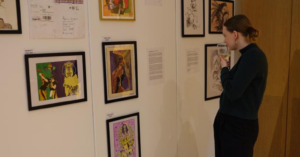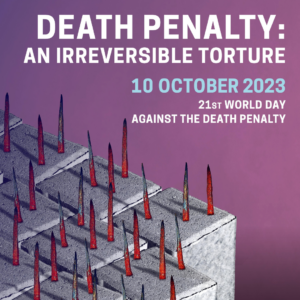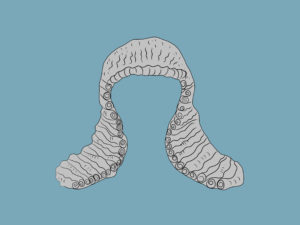
Image credit: Amelia Inglis
Voices from Death Row: Lincoln College to host moving art exhibition
- DPP in the Media
- 12 May 2023
This article was originally posted in The Oxford Student, 7 May 2023.
On Sunday 7 and Monday 8 May, the Oakeshott Room in Lincoln College will come alive with the voices of ghosts.
That was what death row exoneree Peter Ouko likened his own experience to, having been sentenced to death in Kenya for the murder of his wife, a crime he did not commit. He was on death row for 18 years. According to him, death row makes you into a ghost, in more than just a legal sense.
Peter was one of four insightful speakers hosted at the Oakeshott Room on Saturday 6 May for the Voices from Death Row exhibition opening event. Ouko, founder of the youth justice awareness charity Crime Si Poa, was joined by Professor Carolyn Hoyle, Director of the Death Penalty Research Unit within the Centre for Criminology at the University of Oxford; Parvais Jabbar, co-founder and co-executive director of the Death Penalty Project; and Toshi Kazama, a professional photographer and abolition campaigner.
The exhibition was created by Amelia Inglis and Lucrezia Rizzelli, both DPhil candidates at the Centre for Criminology. Inglis, a student of New College, is focusing her research on the death penalty in the US. Rizzelli, a Lincoln student, is studying the punitiveness of the criminal justice system in Indonesia. Both projects are being supervised by Professor Hoyle.
Before the opening event guests were given the chance to get a glimpse of the art that will be on display over the two-day temporary exhibition. It features a mix of styles, including paintings, poems, comic strips, and ornate clothing pieces. One of the most eye-catching pieces was a collage of newspaper clippings related to the death penalty with red handprints painted over the top and “ABOLITION NOW” written at the bottom.
By far the most arresting element of the exhibition was a presentation showing photographs of various death row inmates’ last meals before they were executed. Staring at the favourite foods – or, in some cases, rejected chances for food – of people whose crimes and methods of execution were listed just below was certainly food for thought.
The actual event began with the first two speakers, Hoyle and Jabbar, providing some context to the necessity of increased understanding of death row inmates through exhibitions like this. Hoyle argued that scholarship, combined with the legal expertise that companies like Jabbar’s could provide, was the most effective method of making people more compassionate towards those on death row and advocating for abolition.
When Peter Ouko took to the podium, he showed the audience a harrowing example of what punitive legal systems like that of his native Kenya could do to innocent people. Separated from his young children and mourning the loss of his wife, he spent years of his life locked away in a prison that was once named one of the worst in the world, sharing a 7ft x 8ft cell with thirteen other prisoners. They were forced to sleep on their sides because there wasn’t enough space for them to sleep on their backs and there was no toilet.
A change in the regime prison brought Ouko some hope, as the cells became less cramped and educational programs began to be offered to the prisoners. Peter took on any course that was given to him, becoming the first Kenyan to achieve a law diploma while behind bars. He also started an art club at the prison and he and his fellow inmates painted comic strips on the walls with sly messages mocking the wardens to entertain themselves.
When Ouko was finally exonerated, he stated that his first thoughts were of the inmates he would be leaving behind and what he could do for them on the outside. He founded Crime Si Poa, a charity with a substantial footing in Kenya which is now expanding to other countries, to educate young people on the Kenyan legal system to prevent them from offending. This tied into Hoyle’s idea in her speech that the use of the death penalty as a deterrent from committing crime was pointless when the criminals did not know the gravity of their sentence.
The event’s final speaker was Toshi Kazama who originally made a name for himself as a commercial photographer in New York before deciding to focus on using his art to depict the inhumanity of death row. He has photographed inmates, execution chambers, and the families of both victims and perpetrators. During his talk he showed a series of emotionally-charged photos and explained their significance, including photos he took of a child inmate in a Taiwan prison. His work has had powerful aftershocks, with one of his photos being used in the 2005 Roper v. Simmons US Supreme Court case which outlawed the death penalty being given to minors. He also worked closely with Amnesty International Mongolia in the years leading up to Mongolia abolishing capital punishment in 2016.
To say that this event, both the exhibition itself and the speakers who provided some real-world context to the lives of the people behind the artwork, was incredibly moving would be an understatement. Art is one of the many mediums through which expression of thoughts and feelings is possible and it’s important that these inmates, who are essentially treated as already dead by the systems who sentenced them, have their voices heard. The artwork is amazing to see and the stories of the people who created them are truly emotive. Rizzelli summed it up best when she said that the discussion of these harrowing stories is a “necessary heartbreak” to force action in countries where abolition has not been achieved.
The Voices from Death Row: Art as a Form of Expression exhibition will be available to view in the Oakeshott Room in Lincoln College on Sunday 7 and Monday 8 May from 10am-7pm. Admission is free although donations, which will be divided between three legal justice charities, are welcome. You can read more about the event here.
Image description: An exhibition attendee viewing artwork.



















